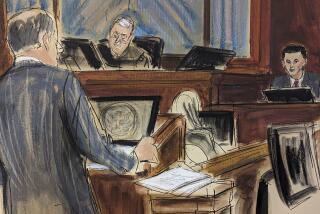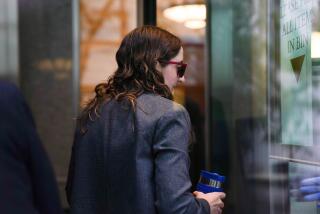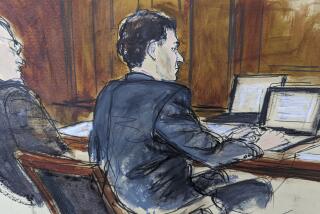Skilling Speaks of Ties to Lay
HOUSTON â Former Enron Corp. Chief Executive Jeffrey K. Skilling on Wednesday testified for the first time about his relationship with his codefendant and ex-boss, Kenneth L. Lay, saying the two made âa good teamâ but never conspired to defraud investors.
Skilling, in his third day on the witness stand, described a two-decade association with Lay that was complementary in business terms but not especially warm.
âIâm not a real social person,â Skilling replied when his chief defense lawyer, Daniel M. Petrocelli, asked whether he saw much of Lay outside of work.
Skilling, 52, testified Monday that his college nickname, A.B., stood for âAll Business.â At Enron, he was known as an intense executive who could be abrasive and profane in his dealings with people inside and outside the company.
By contrast, the 63-year-old Lay, Enronâs founder and chairman, was seen as courtly and engaging, an able diplomat who mixed well with politicians and regulators and was a âgo-to guyâ for civic and charitable causes around Houston.
Legal experts have said that prosecutors may seek to drive a wedge between the two former executives, getting one to try to exculpate himself at the expense of the other. However, there was no hint of any such rift in Skillingâs testimony.
Skilling said the two men focused on different parts of the company. Skilling liked the merchant and retail energy businesses he had developed. He also took the lead in dealing with Wall Street analysts, credit-rating firms and bankers.
Lay, according to Skilling, focused on Enronâs international businesses and relations with Washington. âI was not particularly good at dealing with government officials,â Skilling said.
Skilling dismissed as âcompletely untrueâ the allegation in his and Layâs indictment that they had engaged in a conspiracy to manipulate Enronâs books and conceal its true financial condition. The two face more than 20 years in prison if convicted on all charges.
Asked what he would have done had he ever become aware of criminal activity at Enron, Skilling said: âI would have called the FBI.â After a pause, he smiled tightly and said: âI might have a little hesitation now.â
Petrocelli continued leading Skilling step by step through the indictment and the case that the prosecution presented in the first 10 weeks of the trial.
One allegation is that Skilling tried to disguise the fact that Enron made most of its money through speculative trading in energy markets. Trading is inherently risky, so Wall Street analysts generally accord trading firms a lower stock valuation. The government contends that Enron tried to falsely position itself as a âlogisticsâ company, chiefly a middleman between natural gas or electricity producers and industrial or household consumers.
Critics point to the California energy crisis of 2000 and 2001 as proof that Enron was a speculator at best and an unethical profiteer at worst. But Skilling said Enronâs position in California demonstrated the opposite.
He said Enron had a huge business in California delivering gas and power to wholesale and retail customers, but its trading âexposureâ -- its companywide bet that electricity prices there would rise -- was comparatively small.
At the peak, Enronâs western region power trading desk had a âlongâ position -- a bet on higher prices -- of 20 million megawatt hours, which Skilling said was equivalent to owning a 100-megawatt power plant. Large power plants are 10 to 15 times that size, Skilling said, and Enron at that time had 4,000 megawatts of generators under construction worldwide.
âWas Enron taking massive positions and speculatively trading?â Petrocelli asked.
âIn my opinion, no,â Skilling replied.
Skilling also denied the allegation that Enron maintained âcookie jarâ reserves, or pools of undeclared profit that the company would save up until it needed a last-minute earnings boost to meet the all-important quarterly profit forecasts of Wall Street analysts.
He also tried to rebut the governmentâs charge that a 2001 business reorganization was intended mainly to hide accumulated losses within Enronâs struggling retail energy unit, which primarily sold power to businesses, competing with traditional utilities.
Much of the retail operation was transferred to Enronâs thriving merchant energy business, a largely unregulated unit involved in electricity trading and generation.
But Skilling said the reason for the reorganization was that the two units had developed a feuding relationship that led them to duplicate functions rather than cooperate. The move, Skilling said, created important efficiencies and ended the internecine warfare that wasted time and effort.
Petrocelli said he expected to conclude his direct examination of Skilling today.
Co-lead prosecutor Sean M. Berkowitz is expected to begin cross-examination Monday.
More to Read
Inside the business of entertainment
The Wide Shot brings you news, analysis and insights on everything from streaming wars to production â and what it all means for the future.
You may occasionally receive promotional content from the Los Angeles Times.










